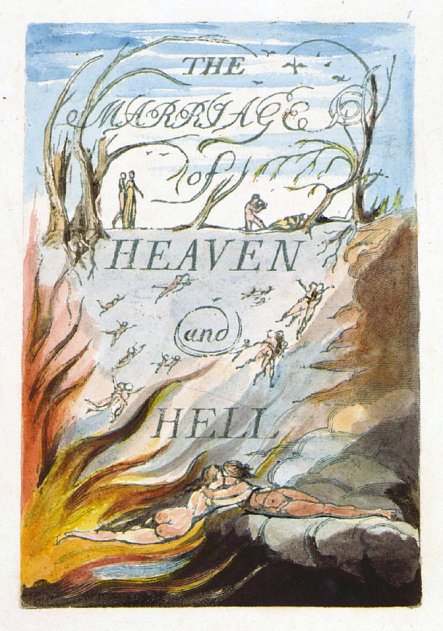“… the connections are seen as active, alive, so that all manifestations of desire, all relations of production, all ‘ghosts of all generations’ interact with and shape one another so that every aspect of human reality bears the overdetermined traces of all the others…” (178, Gross)
In his article titled Teaching, Dialectical Vision, and Blake’s Marriage of Heavenand hell, Hell David Gross talks about the existence of opposites in Blake’s visions he writes about in his Marriage of Heaven and Hell work. Gross emphasizes that the connection between the contradictions creates an atmosphere where this dialectic forms a holistic and totalizing vision. Gross also gives a short history of the ‘dialectic’ term; by combining the definition from various philosophers, Gross uses the term as a representation of these meanings. “The investigation of truth by discussion” (Raymond Williams) and “the method of determining the interrelation of ideas in the light of a single principle” (Plato) and “the continual unification of opposites, in the complex relation of parts to a whole” (Hegel). Gross talks about different scenes from the banquet hall of Blake’s work and says that unclear and suspicious facts become understandable and clear through discussion of opposites and interchange. According to Gross’s argument, Blake’s visions where he states opposites together, create an atmosphere of balance and clear understanding.
Marriage of Heaven and Hell by William Blake is an excellent work where Blake talks about the connections of opposites and gives proverbs with a negative literal meaning but positive connotation. In Plato 3, Blake says;
Without Contraries is no Progression. Attraction and Repulsion, Reason and Energy, Love and Hate are necessary to human existence.
From these contraries spring what the religion call Good & Evil. Good is the Passive that obeys Reason. Evil is the active springing from Energy. Good is Heaven. Evil is Hell.”
In these Lines, Blake talks about the necessary co-existence of opposites to create an atmosphere of balance that is needed for human existence. In the first lines, Blake says that once there is the existence of contraries, there is development and progression. This seems mainly because opposites provide a literal meaning to things that humans have difficulty in understanding. Sometimes we need the opposite of something to understand a concept or a term. In this sense, the opposite also provides us with a new world, different from the one that we are trying to understand. For example, the term heaven brings us a positive connotation where we think of all the good things that make us happy and peaceful; such as green trees, beautiful flowers, and valleys etc. In explaining the term- heaven- we can also refer to hell, which creates the idea of negativeness in our minds. Instantly we are transferred to a world of terrifying fire, death, unhappiness, and graves that make us shiver. In this sense, the contraries used by Blake allow us to comprehend the concept and also progress our mind in gaining new information on other terms.In this sense, the Blakean Dialectic is what Gross talks about in his article. Gross’s argument also suggests that contraries create us a definition where the vision become a whole. We can comprehend and totalize the definition and its connotations. According to Gross and Blake, we use the dialectic to shape the desires, relations, and reality along with imagination.

